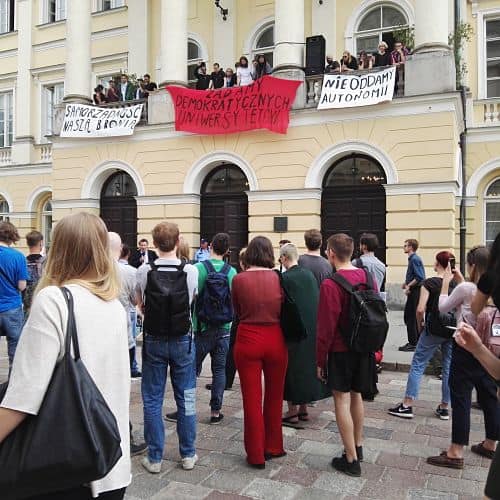As students and academics in Poland are fighting to defend democracy and autonomy of the universities, this post is a battle cry. It outlines the threats to intellectual freedoms posed by the new law on higher education being introduced by the Polish government. It also describes the ongoing protests and sketches an analytic view of the situation.
‘When they kick on your front door, how you gonna come? With your hands on your head, or on the trigger of your gun?’ Joe Strummer’s captivating voice calls in the famous song by The Clash, ‘The Guns of Brixton’. The time has come for Polish academics to ask themselves Strummer’s question. Across the country, students and faculty are in revolt.
For the first time in thirty years—the first time since the fall of the bandit regime that called itself ‘Communist’—university campuses are sites of struggle in defence of democracy. At long last!
In many ways, I think, the university protests are long overdue. Since the victory of the conservative-populist, far-right Law and Justice party (Prawo i Sprawiedliwość, PiS) in the 2015 parliamentary election, Poland has witnessed a fast-paced dismantling of democracy and curtailing of fundamental freedoms. With overnight votes in the Parliament and other procedures of dubious legality, the PiS majority has passed, inter alia, one of the world’s strictest anti-abortion laws, and a reform of the judiciary that gives control of the courts to the Minister of Justice, thus effectively abolishing the tripartite division of powers in the Republic. Meanwhile, hunters’ lobbies have achieved an outrageous liberalisation of the hunting law, while the Ministry for the Protection of the Environment allowed massive logging in Białowieża, Europe’s last remaining primal forest. All of these ‘reforms’, as well as many other new laws, were met with popular protests. Numerous academics have supported all of these protests. More generally, however, one might argue that the academia remained not as vocal as one might expect. But
now it’s the nerds’ turn.
New legislation—proudly dubbed the ‘Constitution for Academia’ by the government, but more commonly referred to as the ‘Law 2.0’, or simply the ‘Gowin Law’, after the Minister for Science and Higher Education, Jarosław Gowin—is being hastily passed these very days. The law needs to be seen simultaneously in the context of Poland’s broader authoritarian turn and as part of the sweeping neoliberalisation of academia across Europe, as witnessed, for instance by the University of Manchester strikes of last year. The Polish academics’ concerns address multiple aspects of the Gowin Law. The law threatens the autonomy of universities and paves the way for their even further commercialisation. It introduces a new institution for governing universities: supervising boards whose prerogatives shall include the ongoing management of universities, deciding on their research and teaching strategies, financial plans, and nominating rectors. By law, more than fifty percent of the members of these boards are to be non-academics: presumably corporate representatives and politicians. The rectors’ relative power will also increase, leading to a further centralisation and hierarchisation of universities. Rectors will gain the right to freely restructure universities, for instance by abolishing Faculties and merging them into larger, more centrally controlled Schools. Faculty boards—key collective institutions representing academic staff—will likewise be easily abolished. Moreover, the new law puts disproportionate emphasis on the commercial applicability of research, while downplaying the social and cultural roles of academia. The State Accreditation Committee (PKA) that rates the quality of study programmes and ranks institutions of higher education is likewise to be reformed to increase the participation of business and employers’ associations. What this means is that commercial applicability shall become the ultimate criterion for assessing academia. These changes are accompanied by a further expansion of qualitative assessment tools for academic outputs—the all too familiar push for translating research and teaching into numerical points. Furthermore, the Gowin Law divides institutions of higher education into two categories. A select number of largest (and presumably best—according to the new law’s business-dictated criteria) institutions will retain the right to call themselves Universities. There will literally be only about a dozen of these across the nation. All other universities in Poland will be degraded to the status of ‘professional academies’ and reduced to the role of producing technical cadres for the economy.
This reform not only expresses a patently absurd (mis)understanding of the value of knowledge, but also is unbelievably regressive in its reaffirming of centre-periphery inequalities in access to higher education.
The government claims the new law has been widely consulted with the academic community. The truth is that the consultation process was a fake throughout. To begin with, the legislation process had started with an open competition for a project of the new law. The Ministry selected those projects that were proposed by groups politically allied with the government and followed Minister Gowin’s own vision. Alternative projects, such as the one submitted by the civic group Crisis Committee for Polish Humanities (KKHP), were rejected wholesale. Further, the law gradually taking shape was consulted exclusively with those academic bodies that supported the government’s line of thinking. Sadly, the government has succeeded in dividing the academic community. Most university rectors, generally support the Gowin Law—and no wonder they do so, given the vastly increased powers that the law offers to them! Unfortunately, however, also faculty and students’ associations at numerous universities are in agreement with the Minister. This mostly applies to technical and managerial faculties, whose ties with business are stronger than among the humanities and social science communities, and whose disciplines are likely to be less harmed by the increasing quantification of academic standards. Evidence from casual conversations suggests, moreover, that members of these sectors of academia have been targets of concentrated propaganda by government proponents of the law and tend to have a rather superficial understanding of the reform. Indeed, in the dramatically underfunded world of Polish academia, ‘reform’ may seem an appealing notion! But as the Polish adage goes, ‘the devil is in the details’. The draft law, that incorporates not a single proposal by those critical of Gowin’s project, is going to be discussed in the lower chamber of the Polish Parliament, the Sejm, on Tuesday, 12 June. The last two years’ experience shows that parliamentary debates on socially controversial new legislation have often been rather perfunctory.
Vast sections of the academic community have risen up. As I am writing these words, several dozen students and faculty at the University of Warsaw have been occupying the balcony of the rector’s office for several days. In a vibrant atmosphere of debate, lectures are delivered from the balcony, and a number of seminar groups have left their classrooms to carry out meetings in front of the building. Among many others, the collective of the Institute of Ethnology and Cultural Anthropology—my own home department—has been at the forefront of this struggle at Warsaw. Colleagues and students have organised workgroups to develop and sustain protest in the short, middle and long-term perspectives. They seek to persuade University authorities to take a critical stance on the reform and are looking for ways to put pressure on members of parliament and Poland’s President to veto the law. Various forms of collective action are being considered, from petitioning to workplace strikes and civil disobedience. The situation unfolds very dynamically. Banners that had been hung out from the windows of the anthropology building in Warsaw’s Żurawia Street—just a few blocks away from the Parliament and from the headquarters of Law and Justice—were removed by housekeeping staff (who are independent from the department and subordinate to the University’s central administration). But the protest has been supported by numerous academic unions across the country, including the otherwise often pro-government Solidarność. Many university departments, faculties, professional and student associations—not only those representing the humanities and social science communities or the largest cities—have officially declared their support for the protest. Collective action has been taken up, among others, at the Universities in Białystok, Cracow, Gdańsk, Łódź, Poznań, Rzeszów, Szczecin and Wrocław. On Friday, students and faculty occupied one of the historic buildings at the Jagiellonian University in Cracow.
‘Academia Is Not a Corporation’, ‘We Won’t Give up our Autonomy’ and ‘We Demand a Democratic Academia!’ read the banners across Poland’s campuses in revolt. But many of the slogans on these banners are also those that have appeared in other popular protests in Poland in recent years: ‘Freedom, Equality, Democracy’, ‘Solidarity is Our Strength!’ Successful revolutions are those that manage to unite the most oppressed groups with the least alienated ones—proletarians with intellectuals. So far, the Law and Justice government in Poland has very skilfully compartmentalised dissent, framing each subsequent protest as an affair of a particular ‘elite’ group defending its privileges. Such a narrative is consistent with the party supporters’ general vision of the world, where parasitic and treacherous ‘elites’ are seen as having appropriated the benefits of Poland’s nearly thirty years’ economic ‘transformation’, at the expense of the general, morally upright mass of the Nation. Moreover, anti-intellectual resentment runs high in this country, where the quality of education has long been in sharp decline (inter alia by systematically diminishing high school standards and effectively erasing university entrance requirements), and where parochialism, chauvinism and obscurantism have been lately promoted to the rank of patriotic virtues. The defence of democracy and autonomy in Polish universities is thus an uphill struggle. In my opinion, reaching out beyond academia itself will be vital for any chance of winning it. The Gowin Law will most likely be passed, perhaps even before this text is published. Stamina and organisational capacity will then be needed to organise long-term resistance to its harmful effects.
In Poland as elsewhere across Europe and beyond, corporations and their political allies have long extended their influence on academia in bolder and bolder ways. Today, they’re kicking right on our front door.









Solidarity!
UPDATE: Last week, the parliament decided to postpone its decision on the Gowin Law until July. Rather than celebrating this as a success of the strike, I believe we should see it as a tactical move by the law’s proponents. They realize full well that in July most students and faculty will be away from the campuses, so it will be harder to organize protests, and the law may pass less contested. The occupation at the University of Warsaw was ended, and strikers countrywide are regrouping – yet the mobilization continues.
Dołączam się niniejszym do protestu wobec pozycji antropologii.